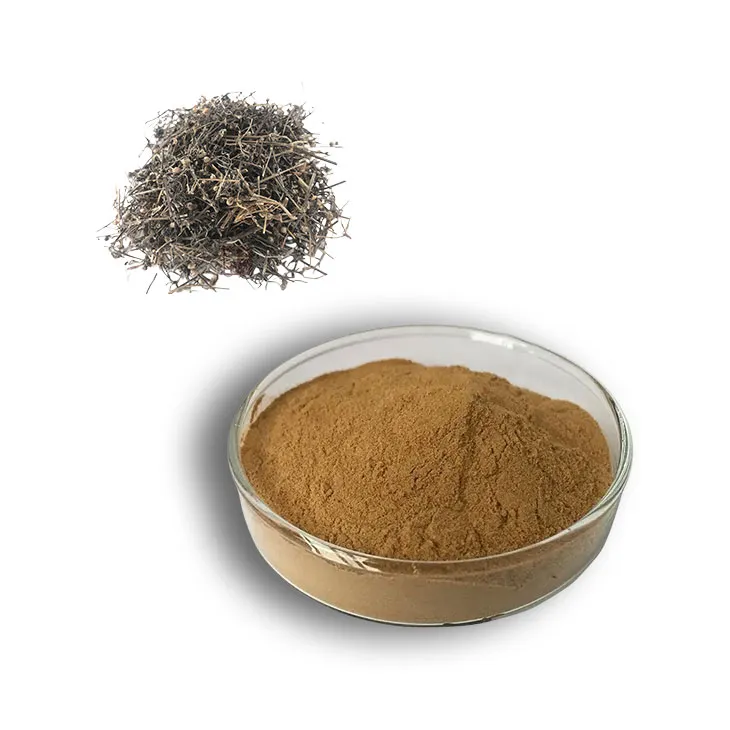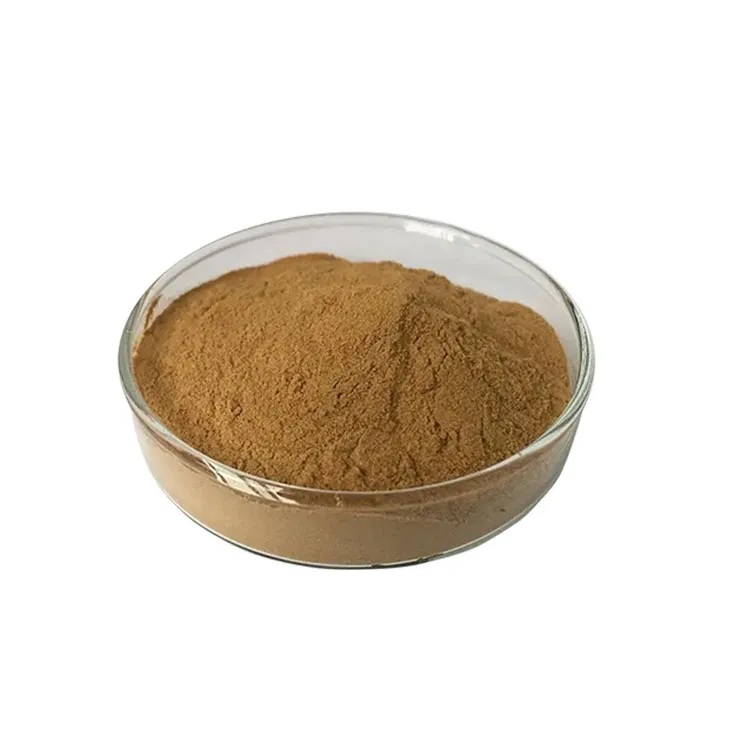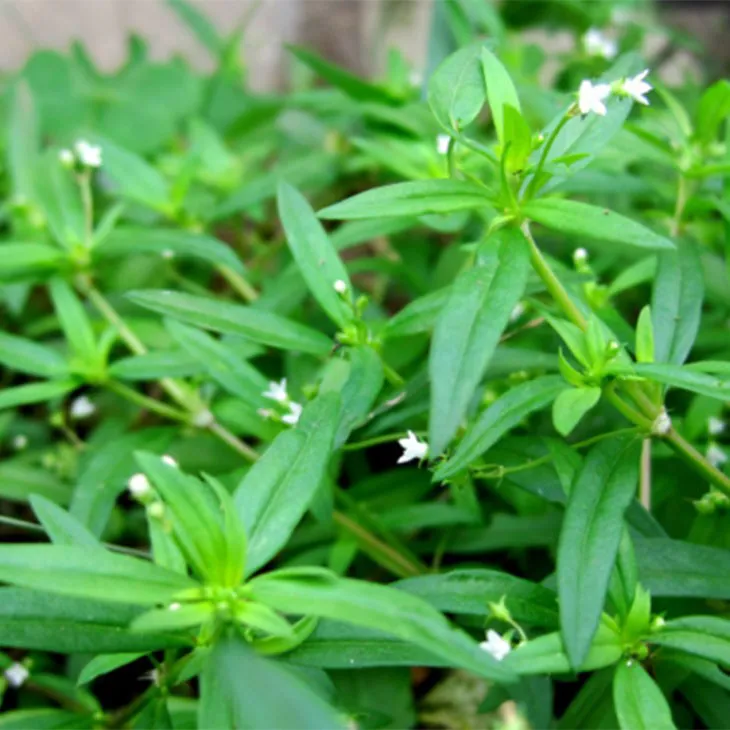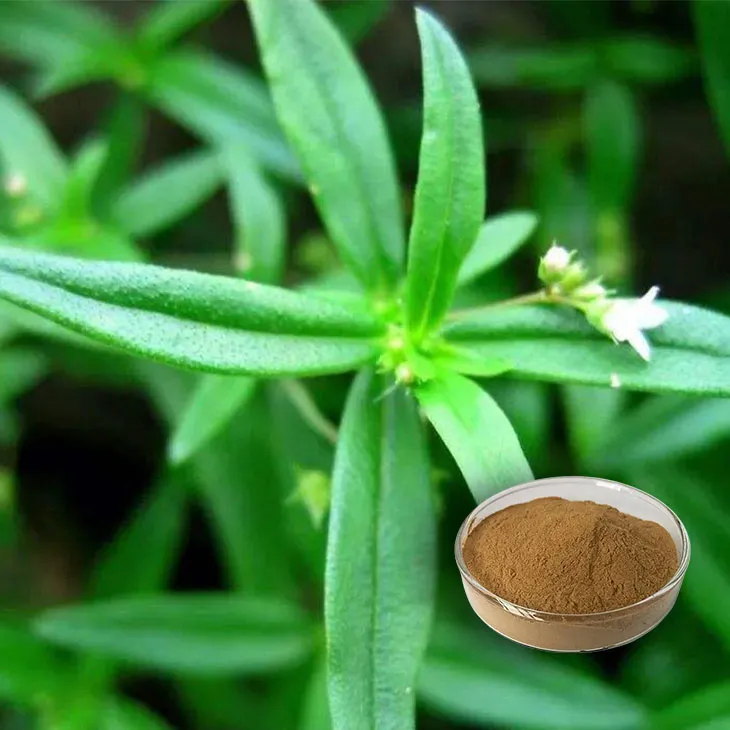- 0086-571-85302990
- sales@greenskybio.com
Bulk Manufacturers and Exporters of Hedyotis Diffusa Extract.
2024-12-16

Introduction
Hedyotis Diffusa, also known as Oldenlandia diffusa, is a herbaceous plant with remarkable medicinal value. In recent times, the global demand for its extract has been increasing steadily. This article aims to provide a comprehensive understanding of the bulk manufacturers and exporters of Hedyotis Diffusa Extract, covering production processes, quality control, market trends, and international trade regulations.

Production Processes
Raw Material Sourcing
Manufacturers begin with the collection of high - quality Hedyotis Diffusa plants. These plants can be sourced either from the wild or from cultivated areas. Sourcing from the wild requires careful consideration to ensure sustainable harvesting. When sourced from cultivation, it allows for better control over the quality and quantity of the plants.
Solvent Extraction
One of the common extraction methods is solvent extraction. Solvents such as ethanol or methanol are typically used. In this process:
- The plant material is soaked in the solvent.
- The solvent helps to dissolve the active compounds present in the Hedyotis Diffusa.
- After a certain period, the solvent with the dissolved compounds is separated from the plant residue.
However, solvent extraction may have some drawbacks, such as the need to remove the solvent completely to obtain a pure extract and potential solvent residues.
Supercritical Fluid Extraction
Another advanced technique is supercritical fluid extraction. This method uses carbon dioxide under specific pressure and temperature conditions.
- Carbon dioxide in its supercritical state has properties similar to both a gas and a liquid, which enables it to effectively extract the active compounds.
- It is more environmentally friendly compared to solvent extraction as carbon dioxide is a non - toxic and non - flammable gas.
- The resulting extract is cleaner, with fewer impurities.

Quality Control
Raw Material Testing
Quality control starts with the testing of raw materials. Reputable manufacturers check for:
- Authenticity: To ensure that the plant material is indeed Hedyotis Diffusa. This can be done through botanical identification methods.
- Purity: To detect any contaminants or adulterants in the raw plants. This may involve chemical analysis to check for the presence of unwanted substances.
Monitoring Extraction Parameters
During the extraction process, manufacturers closely monitor various parameters:
- For solvent extraction, the type and concentration of the solvent, as well as the extraction time and temperature, are monitored to ensure consistent quality.
- In supercritical fluid extraction, the pressure, temperature, and flow rate of carbon dioxide are carefully controlled.
Final Product Analysis
Analytical techniques play a crucial role in final product analysis. High - performance liquid chromatography (HPLC) is widely used:
- HPLC can identify and quantify the active ingredients in the Hedyotis Diffusa Extract.
- It helps to ensure that the extract meets the required standards for medicinal or other applications. For example, in the pharmaceutical industry, the extract must contain a specific amount of the active compounds for it to be effective.

Market Trends
Pharmaceutical Industry Demand
The pharmaceutical industry has a significant demand for Hedyotis Diffusa Extract.
- Anti - cancer Properties: Research has suggested that the extract may have potential anti - cancer effects. This has led to increased interest from pharmaceutical companies in developing drugs based on the extract.
- Anti - inflammatory and Immunomodulatory Effects: The extract's anti - inflammatory and immunomodulatory properties also make it a valuable candidate for the development of new medications for various inflammatory and immune - related diseases.
Natural Health Products Market
The natural health products market has also shown great enthusiasm for Hedyotis Diffusa extract.
- Dietary Supplements: The extract is being used in dietary supplements. As consumers are more inclined towards natural remedies, the use of the extract in supplements has been on the rise.
- Wellness and Preventive Health: People are increasingly using natural products for overall wellness and preventive health. The extract's potential health benefits make it an attractive option in this regard.
Regional Export Trends
The export of Hedyotis Diffusa extract has witnessed a significant upward trend, especially to certain regions:
- North America: There is a growing market for natural products in North America. The extract is being imported for use in both the pharmaceutical and natural health products sectors.
- Europe: European consumers are also showing a preference for natural remedies. The strict regulations in Europe regarding quality and safety have led to a demand for high - quality Hedyotis Diffusa extract.
- Asia - Pacific: In the Asia - Pacific region, the traditional use of herbs in medicine has contributed to the demand for the extract. Additionally, the growing middle - class population with increased disposable income is also driving the market.

International Trade Regulations
Quality and Safety Regulations
Exporters of Hedyotis Diffusa extract must comply with quality and safety regulations.
- Countries may have different standards for the quality of the extract. For example, limits on the levels of impurities, heavy metals, and microbial contaminants.
- Ensuring the safety of the extract for human consumption is of utmost importance. This may involve pre - market approval processes in some countries.
Import Restrictions on Plant - Based Products
Some countries have restrictions on the import of certain plant - based products:
- Phytosanitary Requirements: To prevent the introduction of pests and diseases, countries may require phytosanitary certificates for the import of Hedyotis Diffusa extract.
- Banned or Restricted Substances: There may be regulations regarding certain substances present in the extract. For example, if the plant contains any substances that are considered harmful or restricted in a particular country, it may affect the importability of the extract.
Certification Requirements
Exporters may need to obtain specific certifications:
- Good Manufacturing Practice (GMP): This certification ensures that the manufacturing processes are carried out in a proper and controlled manner, meeting quality and safety standards.
- Organic Certification: If the plants are organically grown, an organic certification can enhance the marketability of the extract, especially in markets where organic products are highly demanded.
Documentation for International Trade
Proper documentation is essential for smooth international trade:
- Certificates of Analysis: These documents provide details about the chemical composition and quality of the extract.
- Certificate of Origin: It indicates the origin of the product, which can be important for customs clearance and to meet certain trade agreements.
- Phytosanitary Certificates: As mentioned earlier, these are required to ensure that the product is free from pests and diseases.
Conclusion
The bulk manufacturers and exporters of Hedyotis Diffusa extract are vital in fulfilling the global demand for this valuable plant extract. By following strict production and quality control processes and adhering to international trade regulations, they can contribute to the sustainable growth of this industry. It is essential for all stakeholders in this field to stay updated with the latest technological advancements in production, quality control methods, market trends, and international trade regulations to ensure the continued success of the Hedyotis Diffusa extract business.
FAQ:
What are the common extraction methods for Hedyotis Diffusa extract?
There are mainly two common extraction methods for Hedyotis Diffusa extract. One is solvent extraction, in which solvents like ethanol or methanol are often used. The other is supercritical fluid extraction, which uses carbon dioxide under specific pressure and temperature conditions. Supercritical fluid extraction is more environmentally friendly and can produce a cleaner extract.
How do manufacturers ensure the quality of Hedyotis Diffusa extract?
Reputable manufacturers ensure the quality of Hedyotis Diffusa extract through strict quality control measures at every production stage. They test the raw materials for authenticity and purity, monitor the extraction parameters for consistent quality, and conduct final product analysis. High - performance liquid chromatography (HPLC) is used to identify and quantify the active ingredients to make sure the extract meets the required standards for medicinal or other applications.
Why is the market for Hedyotis Diffusa extract growing?
The market for Hedyotis Diffusa extract is growing because of its potential medicinal properties. In the pharmaceutical industry, it has potential anti - cancer, anti - inflammatory, and immunomodulatory properties. Also, in the natural health products market, it is in demand for use in dietary supplements. As consumers increasingly prefer natural remedies, the demand for this extract has been rising.
What international trade regulations do exporters of Hedyotis Diffusa extract need to follow?
Exporters need to be well - aware of regulations regarding the quality and safety of the extract. Some countries may have restrictions on the import of certain plant - based products. For example, specific certifications such as Good Manufacturing Practice (GMP) or Organic Certification may be required. Also, proper documentation including certificates of analysis, origin, and phytosanitary certificates is essential for smooth international trade.
Where are the main export destinations for Hedyotis Diffusa extract?
The main export destinations for Hedyotis Diffusa extract are regions such as North America, Europe, and Asia - Pacific. These regions have a high demand for this extract, either in the pharmaceutical industry or in the natural health products market due to the growing interest in natural remedies.
Related literature
- Medicinal Properties of Hedyotis Diffusa: A Review"
- "The Production and Quality Control of Plant Extracts: Focus on Hedyotis Diffusa"
- "Market Trends of Natural Plant Extracts: The Case of Hedyotis Diffusa"
- "International Trade Regulations for Herbal Extracts: Hedyotis Diffusa as an Example"
- ▶ Hesperidin
- ▶ Citrus Bioflavonoids
- ▶ Plant Extract
- ▶ lycopene
- ▶ Diosmin
- ▶ Grape seed extract
- ▶ Sea buckthorn Juice Powder
- ▶ Fruit Juice Powder
- ▶ Hops Extract
- ▶ Artichoke Extract
- ▶ Mushroom extract
- ▶ Astaxanthin
- ▶ Green Tea Extract
- ▶ Curcumin
- ▶ Horse Chestnut Extract
- ▶ Other Product
- ▶ Boswellia Serrata Extract
- ▶ Resveratrol
- ▶ Marigold Extract
- ▶ Grape Leaf Extract
- ▶ New Product
- ▶ Aminolevulinic acid
- ▶ Cranberry Extract
- ▶ Red Yeast Rice
- ▶ Red Wine Extract
-
Cocoa Extract
2024-12-16
-
Centella Asiatica Extract
2024-12-16
-
Alfalfa Meal
2024-12-16
-
Scutellaria Extract
2024-12-16
-
Hesperidin
2024-12-16
-
Maitake Mushroom Extract
2024-12-16
-
Beetroot Powder
2024-12-16
-
Camu Camu Extract
2024-12-16
-
Red Vine Extract
2024-12-16
-
Shikonin
2024-12-16





















